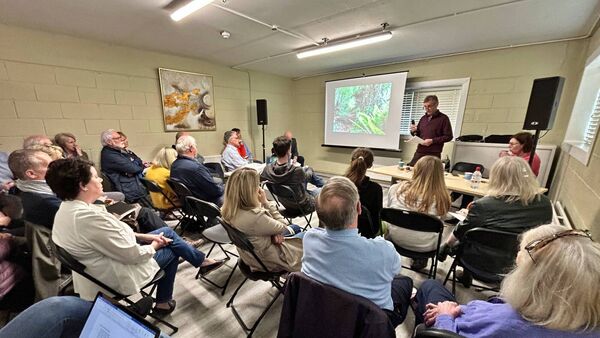Battery storage fire sparks concerns for Kildare opponents

Photo for illustrative purposes only
Ireland could lead in responsible energy storage, but only if the country implements robust regulations for lithium-ion battery energy storage systems. At this time there is no such regulation, allowing a free for all by developers of Li-BESS projects.
That's the view of Hugh Dillon, a veterinary practitioner near Two Mile House who says that two recent fires relating to lithium batteries — one in County Galway — have once again highlighted potential dangers to communities from the technology.
Mr Dillon is a member of a campaign group — Two Mile House Says No — against a proposed BESS at Dunnstown, near Carnalway, for which planning permission was refused by Kildare County Council, but which is now the subject of a second appeal at An Bord Pleanála (ABP).
The Galway fire on 29 January last, involving batteries in a shipping container at the Xerotech facility in Claregalway, forced the evacuation of two schools and about a dozen homes and closed other businesses in the Claregalway Corporate Park.

It was burning for three days before being decreed contained, and a number of firefighters were taken to hospital as a precaution because of concerns. Xerotech permanently closed down following the fire.
Abroad, an incident at the Vistra Energy power plant in Moss Landing, California, on 16 January 2025 led to the evacuation of 1,500 people over 20 square kilometres and the closure of a major highway.
The two fires are the latest in a total of more than 50 similar around the world which the Two Mile House campaigners compiled to help make their case.
"These latest events underscore the potential hazards of Li-BESS," Mr Dillon said, "including fire risks and the release of dangerous substances such as hydrogen fluoride, particulate matter, and polyfluoroalkyl substances (PFAS)."
During the planning application process for the Dunnstown project proposed by Strategic Power Projects Limited, the lack of regulations became clear.
"There is no requirement for an Environmental Impact Assessment during planning, and these systems do not fall under the Control of Major Accidents and Hazards (COMAH) regulations," Mr Dillon said.
"This regulatory gap means neither the Environmental Protection Agency nor the Health and Safety Authority has direct oversight of these electrochemical installations."
A bill introduced last October in the Seanad by Green Party Senator Vincent Martin — also a resident of the Two Mile House area — aimed to strengthen regulations.
His Planning and Development (Stationary Battery Energy Storage Systems) Bill 2024 proposed the requirement of an EIS for such installations. That bill, co-sponsored by senators Robbie Gallagher, Martin Conway, Tom Clonan, Diarmuid Wilson and Micheál Carrigy, lapsed with the dissolution of the Dáil when the General Election was called.
Mr Dillon said that the bill, if it had passed, would have addressed some concerns.
But he asserts that a more comprehensive approach is needed to align with international standards and he is appealing to the new government to get these under way.
"The National Fire Chiefs Council (UK) guidelines and the global non-profit National Fire Protection Association standards, particularly NFPA 855, provide essential frameworks for safe installation and operation. Currently, it is not mandatory for developers to meet these standards in Ireland."
Mr Dillon emphasises that Li-BESS is important in meeting future energy needs and that the world needs to embrace the benefits of energy storage.
"But it is crucial to implement proper regulations and we must ensure that progress doesn't compromise public safety and environmental protection.
I urge the government to take immediate action to address this regulatory gap, implement comprehensive guidelines for Li-BESS, and ensure all installations meet the highest safety standards.
“It's time for Ireland to lead in responsible energy storage, balancing renewable energy goals with public safety and environmental stewardship."
The original planning application for the Dunnstown BESS, which would be one of the largest in Europe if it was built, was refused by KCC in 2021 on grounds that included a negative report by the County Fire Officer.
An Bord Pleanála overturned that decision in September 2022, but last March the High Court quashed the ABP decision on the basis that the Board had failed to adequately engage with the submissions on water supplies for firefighting, including a report from internationally respected fire safety consultant Dr Paul Christensen.
In May 2024, a further appeal was lodged with ABP by Strategic Power Projects, outlining proposed changes to the plan, described as 'significant further information'.
The Two Mile House Says No group said these changes were 'substantial and material' and should not be part of an appeal, as opposed to the submission of a totally new application to Kildare County Council.
While a decision by ABP was due to be made by 19 August 2024, that hasn't happened and the current status is 'live case'.





